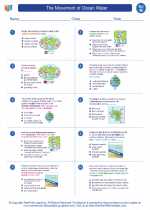Parasitoids
Parasitoids are a type of organism that develops within or on the body of another organism, eventually killing it. They are a unique group of organisms that exhibit both parasitic and predatory behaviors.
Characteristics of Parasitoids
- Parasitoids typically lay their eggs on or inside a host organism.
- Once the eggs hatch, the larvae feed on the host's tissues, eventually leading to the host's death.
- Parasitoids often display specialized behaviors and adaptations to locate and exploit their hosts.
- They are commonly used as biological control agents against pest insects in agriculture.
Life Cycle of Parasitoids
Parasitoids undergo complete metamorphosis, typically consisting of four stages: egg, larva, pupa, and adult.
Ecological Impact
Parasitoids play a significant role in regulating populations of their hosts and are important in maintaining ecological balance.
Examples of Parasitoids
Some well-known examples of parasitoids include parasitic wasps, tachinid flies, and certain species of parasitic nematodes.
Study Tips
- Understand the difference between parasitoids and parasites.
- Learn about the various strategies used by parasitoids to locate and attack their hosts.
- Explore the ecological importance of parasitoids in natural and agricultural ecosystems.
- Study specific examples of parasitoids and their interactions with their hosts.
◂Science Worksheets and Study Guides Eighth Grade. The Movement of Ocean Water
Study Guide The Movement of Ocean Water
The Movement of Ocean Water  Worksheet/Answer key
Worksheet/Answer key The Movement of Ocean Water
The Movement of Ocean Water  Worksheet/Answer key
Worksheet/Answer key The Movement of Ocean Water
The Movement of Ocean Water  Worksheet/Answer key
Worksheet/Answer key The Movement of Ocean Water
The Movement of Ocean Water  Vocabulary/Answer key
Vocabulary/Answer key The Movement of Ocean Water
The Movement of Ocean Water  Vocabulary/Answer key
Vocabulary/Answer key The Movement of Ocean Water
The Movement of Ocean Water 

 Worksheet/Answer key
Worksheet/Answer key
 Worksheet/Answer key
Worksheet/Answer key
 Worksheet/Answer key
Worksheet/Answer key
 Vocabulary/Answer key
Vocabulary/Answer key
 Vocabulary/Answer key
Vocabulary/Answer key

The resources above cover the following skills:
Earth/Space Science: Students will use scientific skills and processes to explain the chemical and physical interactions (i.e., natural forces and cycles, transfer of energy) of the environment, Earth, and the universe that occur over time.
Interactions of Hydrosphere and Atmosphere: Cite evidence to explain the relationship between the hydrosphere and atmosphere.
Identify and describe how the temperature and precipitation in a geographic area are affected by surface features and changes in atmospheric and ocean content: Relative location of mountains; Volcanic eruptions; Proximity to large bodies of water; Heat energy of ocean currents.
Interactions of Hydrosphere and Atmosphere: Recognize and describe the various factors that affect climate.
Identify and describe how the temperature and precipitation of an area are affected by surface and ocean features: Relative location of mountains; Proximity to large bodies of water; Warm and cold ocean currents.
Recognize and describe the global effects of volcanic eruptions, greenhouse gases, and El Nino.